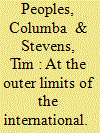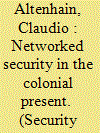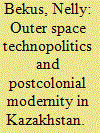|
|
|
Sort Order |
|
|
|
Items / Page
|
|
|
|
|
|
|
| Srl | Item |
| 1 |
ID:
175554


|
|
|
|
|
| Summary/Abstract |
As staples of science fiction, space technologies, much like outer space itself, have often been regarded as being ‘out there’ objects of international security analysis. However, as a growing subset of security scholarship indicates, terrestrial politics and practices are ever more dependent on space technologies and systems. Existing scholarship in ‘astropolitics’ and ‘critical astropolitics’ has tended to concentrate on how such technologies and systems underpin and impact the dynamics of military security, but this article makes the case for wider consideration of ‘orbital infrastructures’ as crucial to conceptions and governance of planetary security in the context of the ‘Anthropocene’. It does so by outlining and analysing in detail Earth Observation (EO) and Near-Earth Object (NEO) detection systems as exemplary cases of technological infrastructures for ‘looking in’ on and ‘looking out’ for forms of planetary insecurity. Drawing on and extending recent theorisations of technopolitics and of Large Technical Systems, we argue that EO and NEO technologies illustrate, in distinct ways, the extent to which orbital infrastructures should be considered not only part of the fabric of contemporary international security but as particularly significant within and even emblematic of the technopolitics of planetary (in)security.
|
|
|
|
|
|
|
|
|
|
|
|
|
|
|
|
| 2 |
ID:
182693


|
|
|
|
|
| Summary/Abstract |
Although infrastructures may be material manifestations of state territorial power, the political effects of infrastructures are seldom straightforward. And yet, many accounts of the Belt and Road Initiative (BRI) assume a relatively conventional approach to politics, and to political power. Geopolitical intentionality and top-down policy and strategic planning tend to be emphasised over project-level analyses. In response to what might be viewed as an invented BRI geopolitics, this essay suggests a more technopolitical framing of the Belt and Road and seeks to apply an infrastructural analytic to the question of how political power is realised or frustrated, enhanced or diverted, by the distributed and relational nature of infrastructure projects. It argues that our understanding of the socio-technical complexities of infrastructure is poorly served by viewing them through a conventional geopolitical lens. Instead, it seeks to lay out a research agenda and analytical framework for addressing the questions of how infrastructure projects grow and evolve, how they are embedded within the social-political-cultural contexts in which they develop and how they produce political effects that at times align with broader-scale geopolitical agendas and at other times do not.
|
|
|
|
|
|
|
|
|
|
|
|
|
|
|
|
| 3 |
ID:
189464


|
|
|
|
|
| Summary/Abstract |
The saturation of urban space with all kinds of information and communication technology–driven security devices has long since turned into a recurrent topic of both human geography and critical security studies. However, comparatively little effort has been made to analyze these technologies and infrastructures in relation to their locally specific modes of deployment. This relative failure to account for technopolitical path-dependencies may result in unilaterally positivistic descriptions, when, in fact, there is no such thing as a technopolitically and/or semantically ‘virgin’ urban fabric waiting to accommodate a new securitarian blueprint. The present article aims to address this lacuna by analyzing the introduction of a ‘smart’ surveillance system in São Paulo, Brazil. Taking as its point of departure the condomínio fechado (the ‘closed condominium’) as a locally specific urban diagram, it sets out to trace the system’s implementation along the lines of a (post)colonial topology sorting bodies and organizing circulations according to a historically entrenched pattern of social domination. Accordingly, despite its failure to significantly reduce crime rates and raise the general level of public security, the system succeeded in further normalizing a configuration in which the obsession with personal security eclipses any potential for political transformation. Its implementation thus endorses a social status quo that is both structurally violent and profoundly unequal.
|
|
|
|
|
|
|
|
|
|
|
|
|
|
|
|
| 4 |
ID:
185927


|
|
|
|
|
| Summary/Abstract |
This article examines the role of outer space technopolitics in post-Soviet Kazakhstan. It explores how outer space, the technological artefact of global relevance, works as a postcolonial fetish of modernity that is called upon to produce what it represents, that is, the reality of a technologically advanced Kazakh nation. The article shows that in its project of becoming a spacefaring nation the country reiterates major incentives that have motivated nuclear and space programme development in the postcolonial context of the Global South. It explores how collaboration with Russia allows Kazakhstan to claim its share in the Soviet space legacy rather than to distance itself from it. The study then traces the rise of a new internationalism in the Kazakhstani space programme outside the post-Soviet context. The article contributes to the debate on postcolonial technopolitics and shows how outer space has been used to enhance the conventional domain of postcolonial national ideologies – nativism and tradition – with technology and science. Finally, it depicts how the growing resistance to the space programme among Kazakh civil society groups reveals a close association of the environmental agenda with an ‘eco-nationalism’ permeated by a profoundly anti-imperial and, ultimately, anti-authoritarian political discourse.
|
|
|
|
|
|
|
|
|
|
|
|
|
|
|
|
| 5 |
ID:
189467


|
|
|
|
|
| Summary/Abstract |
In response to broader political and corporate tendencies towards ‘techno-solutionism’, critical studies of security technology highlight the threat that security technologies pose to civil rights and democratic accountability. This article argues for a slightly different perspective: rather than taking claims of technological efficacy at face value, it explores the multiple ways in which security-related technology so frequently fails to deliver its – confidently anticipated or feared – effects. A focus on sociotechnical failure can offer more comprehensive, on-the-ground understanding of the technopolitics of security. We suggest that these politics may lie precisely in the blurring of concepts of failure and success, as ‘prototyping’ and experimentation become an increasingly powerful logic of urban governance. This argument is developed through an analysis of security interventions in Jamaica, a context characterized by high levels of violent crime. The article focuses on three technologies that have been adapted to security-related purposes: a communication channel connecting police and private security guards, a public–private CCTV network, and a smart electricity grid. Drawing on approaches from science and technology studies, the article adopts a process-oriented approach, attending to both the discourses surrounding the introduction of these technologies and their everyday interactions with their social and built environments.
|
|
|
|
|
|
|
|
|
|
|
|
|
|
|
|
| 6 |
ID:
191980


|
|
|
|
|
| Summary/Abstract |
In the early 2000s, the George W. Bush administration condemned Iran’s use of nuclear-fuel-cycle technologies while endorsing sensitive nuclear activities in South Korea. The politics behind this difference may appear self-evident, but maintaining this policy was premised on a complex interaction between technology and politics. This paper examines both US and international definitions of uranium enrichment and spent-fuel reprocessing and finds an incoherence between technical definitions and policy implementation. Definitions of enrichment are narrow, as they refer to a very specific set of material processes. But the Bush administration applied a capacious standard when debating what it meant for Iran to “suspend” enrichment-related activities. On the other hand, definitions of reprocessing are capacious, implicating many different processes that can be interpreted as reprocessing. And yet the Bush administration applied a narrow standard as it sought to assist South Korea’s pyroprocessing efforts. By positing a reciprocal relationship between technology and politics, this article challenges both the position that technical solutions can solve entrenched political conflicts, and also the simplified narrative that great-power politics trumps shared technical and legal standards. Interpretive conflicts over technical standards are shaped by politics, and yet technical contestation also limits and bounds political manipulation.
|
|
|
|
|
|
|
|
|
|
|
|
|
|
|
|
| 7 |
ID:
189463


|
|
|
|
|
| Summary/Abstract |
This introduction to the special issue on ‘the technopolitics of security’ outlines key concepts and engages debates pertaining to the relationship between techno-materiality, security governance and struggles over sovereignty. ‘Technopolitics’ refers to the strategic practice of designing and using technologies to enact political goals, producing hybrid forms of power that combine cultural, institutional and technological dimensions. These technopolitical practices give rise to new forms of agency, producing effects unintended by their designers that may alter logics of political contestation and allow technologies to be reappropriated for different political purposes. To illustrate the distributed forms of agency and contingent encounters that the technopolitics approach evokes, the article develops three key aspects of technopolitics in its relationship to security governance: (1) an understanding of agency as distributed between human and non-human actors, but also asymmetric in that human intentionality plays an assembling role that is frequently overrun by the unintended effects; (2) the temporal horizons of imagination and action over which technopolitical interventions unfold, identifying the importance of logics of anticipation and eventization; and (3) the relationship between technopolitics and sovereignty, arguing that it encourages a decentred and materialized understanding of how claims to sovereignty are made and contested.
|
|
|
|
|
|
|
|
|
|
|
|
|
|
|
|
|
|
|
|
|